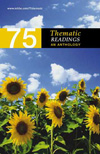
Studs Terkel |  |
Studs TerkelStuds Terkel, "Who Built the Pyramids: Mike Lefevre" Studs Terkel (1912- ) was born in New York City and earned both a
Ph.B. (1932) and a J.D. (1934) from the University of Chicago. Terkel
has been a civil service worker, an actor, and a television and radio
host. His books include Hard Times: An Oral History of the Great Depression
(1970), Working: People Talk About What They Do All Day and How They
Feel About What They Do (1974), "The Good War": An Oral
History of World War Two (1984), and My American Century (1997).
Terkel also contributes to periodicals such as The Nation, the
Los Angeles Times, and New Choices for Retirement Living.
Among many awards and honors, Terkel has won the Peabody Award in 1980
for his radio work, the Pulitzer Prize for nonfiction ("The Good
War") in 1985, and the National Humanities Medal in 1997. "Who
Built the Pyramids: Mike Lefevre" examines the meaning of work from
the point of view of a steel worker. It's an excerpt from Working. | QUESTIONS FOR DISCUSSION | CONTENT - Who is Benjamin Spock?
- Why does Mike Lefevre say it was more satisfying to work for a
trucker than in a steel mill?
- Define the term effete snob.
- What does Lefevre mean when he says, "Everybody should have
something to point to"?
- Why does Lefevre avoid fighting with his foreman?
- What shows does Lefevre watch on television? What does this suggest
about the way he uses that mass medium?
- Describe Lefevre's work shift.
STRATEGY AND STYLE - Review this piece and find a place or two where a stereotype about
working people is directly questioned. What does this say about Lefevre?
What does this say about the relationship of Terkel to his narrator?
- What do you make of the use of profanity in this essay? How could
Terkel have otherwise presented this information? What does its inclusion
do to the tone of the piece? Why do you think he left it in?
- Study paragraph twenty-four. What kind of blending is going on
here? What does this say about the relation of the narrator to his job?
- Terkel doesn't ask a direct question until thirty-three paragraphs
in. Is he doing a bad job as an interviewer? In what ways does this
delay give voice to the narrator? How would his voice change with a
different approach?
- Examine the metaphor at the end of paragraph thirty-two, in which
Lefevre compares his job to something else. What is the full comparison
and what mental image does it create?
| ENGAGING THE TEXT | - Have you ever had a dull, repetitive, or mindless job? Maybe you've
done a dull chore or two. (If you haven't, imagine one.) Is there anything
positive to take away from this experience? Under what circumstances?
Explain.
- What mark would you like to leave on the world? How can you relate
your feelings about this to your reading?
| SUGGESTIONS FOR SUSTAINED WRITING | - Write an essay debating the pros and cons of making a twenty-hour
workweek the standard in the U.S.
- Write an essay about the cycle of life that the narrator of this
essay describes. Be sure to mention his notions of the continuum, work,
family, education, and leaving a mark. Do you think Lefevre considers
his contribution to Working a "mark"? Explain.
| FOR FURTHER RESEARCH | Do some research to find out what has happened to the steel mills in
Cicero, Illinois over the past three decades or so. How typical is this
of the pattern in the Midwest over the same time? Where are people at
roughly Mike Lefevre's income level working now? In what kinds of jobs? | WEB CONNECTION | Did you know that Studs Terkel has been a fairly frequent contributor
to films and tv as an actor, narrator, and writer? Check out his filmography
at imdb.com. | LINKS | Biographical Looking for a place to start your online research of Terkel? Well,
visit the homepage of StudsTerkel.org.
The page has a nice photo, and links to a bio, some galleries, a search
engine, and a site map. The New York State Writers Institute prepared this biography
of Terkel in 1999. It has photos, information about his radio appearances,
book covers, and quotations.
Bibliographical Here's an interview
with the author called "Studs Terkel: An Interview with the Man
Who Interviews America." It was conducted in 1996 and examines
his views of things at the age of eighty-three. It's multimedia time! This gallery
has some photos, an excerpt, and links to audio centering around Terkel's
book Division Street.
Cultural This page
from CNN.com WebLive has a wealth of multimedia links about Terkel's
life and work, including information about his tv show, an audio interview,
and lots of photos. This is the citation
for Terkel's Pulitzer Prize. What other authors do you recognize on
this page? What does this say about the company Terkel's keeping here? This author has also won a Peabody Award, a very prestigious honor
for broadcasters. Find out more about it by clicking here
and searching the site.
|
|
|
|